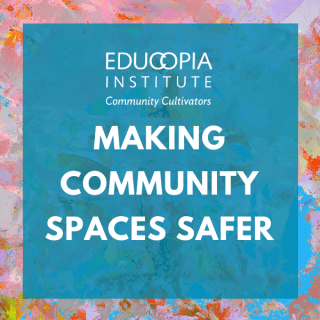
February 16, 2021
Making Community Spaces Safer: On Being “Caring”
By Hilary Faith HickmanOver the course of 2020-2021, members of the Educopia staff will be contributing blog posts to the “Making Community Spaces Safer” series. Each post will explore one of our organizational values and describe our efforts to live into that value, including our successes, our failures, and the hard-won lessons that occur in between. We will announce new posts on the Educopia website and on Twitter.
I’ll admit, when I first started working at Educopia, I held the “work-life balance” card close to my chest.
I was hesitant to become known as one of the team members who practiced and advocated for a “work-life balance” because like many of us, most of my prior experience had taught me a clear lesson about how you advance in professional settings. I had learned that gains required significant sacrifice, particularly in the critical areas of mental and physical health, family, and personal transparency.
At some point during my first year at Educopia, I realized that this was an organization apart. Work-life balance was top-of-mind for many and a recurring conversation point. I was encouraged to take time off, to say “no,” to draw boundaries, and to ask questions when it seemed like our small organization might be biting off more than we could chew.
Before long, my kind and thoughtful colleagues began publicly expressing gratitude for my willingness to do what, at the time, still felt new and slightly unsettling. I wondered, “have I finally said ‘no’ one too many times? Have I finally questioned our capacity more than the leadership was willing to abide?” Fortunately, I hadn’t, on either account. These contributions continued to be valued and I was able to rise through the organization on a “work-life balance platform” or, as I’ve sometimes jokingly called it, on “a foundation of no.”
Educopia has always considered itself a values-driven organization, and in 2018, we made that commitment manifest in the form of a values statement. One of those values continues to ring in my ears, and that is our ongoing effort to be “caring.” Here’s how we define it:
Educopia is caring. We nurture communities that nurture their members.
Educopia recognizes that communities are made up of people, and that the community thrives when its individual members do. We encourage bridge-building and collaboration, and we cultivate a sense of nurturing and kindness across all of our initiatives.
In particular, I’ve always been struck by the line “Educopia recognizes that communities are made up of people, and that the community thrives when its individual members do.” To me, that’s a recognition of our individual and collective humanity, an acknowledgement that we lead whole and rich lives outside of work. It’s a call-to-action, insisting that we hold that part of our existence in equal esteem and that we protect it and nurture it.
A meaningful statement, to be sure, but words are words and actions are actions. What does it look like to live this value in our day-to-day work?
It looks like taking a mental health day with no qualms, it looks like flexible hours, long walks, kids in Zoom calls, canceling meetings, extending deadlines, impromptu vacations, extra hours off when the world falls apart, no video days, a generous vacation policy, and being quick with a kind and understanding word.
We strive for work-life balance, but make no mistake, we often fail to strike it. We are our own little community, made up of people who are kind, generous, and so very human.
If you’re familiar with Educopia, you probably know that we have a large and diverse portfolio of work that spans sponsored research, hosting and cultivating affiliated communities, and consulting. It’s a small but growing organization that cares deeply about collective action and empowering groups and communities to achieve their shared goals.
With deep caring, or what some refer to as “passion,” comes risk. An organization runs the risk of romanticizing the cause and seeing overwork as a virtuous sacrifice on the road to a better world. We, at Educopia, have certainly struggled to balance the depths of our caring with the very real and damaging effects of overworking, including burnout, mental and physical health issues, and hits to interpersonal relationships. It is a constant point of reflection for our team, and we have work to do when it comes to fully living and modeling that value for others.
A few years ago, I saw someone on Twitter saying something to the effect of, “I’m on an awards committee and every one of these nominations is extolling how many extra hours the candidate works, how they live and breathe their position. I would love to live in a world where we rewarded folks for practicing balance, for resisting that urge, and for resetting expectations about the role of work in our lives.”
I really need to find that tweet again, because it hasn’t left my mind since. It’s the kind of world I want to live in, as well, and I’m fortunate to work in an organization where I can make that sentiment known and have it shared by my colleagues. That being said, I also know that our team will inevitably have many more awkward conversations where we push on each other about our capacity and say no to opportunities that will always seem like they might be our last.
However, if we can do that—if we can continue to give permission to ourselves and to our colleagues to care for themselves in and outside of work—then we will be one step closer to fully realizing our value of care. We will also be a better place to work, a stronger collaborator, and a human-first organization that is prepared to contribute to a kinder, more humane professional ecosystem within and beyond a global pandemic that has only reminded us, time and time again, of the value of care and care-giving.